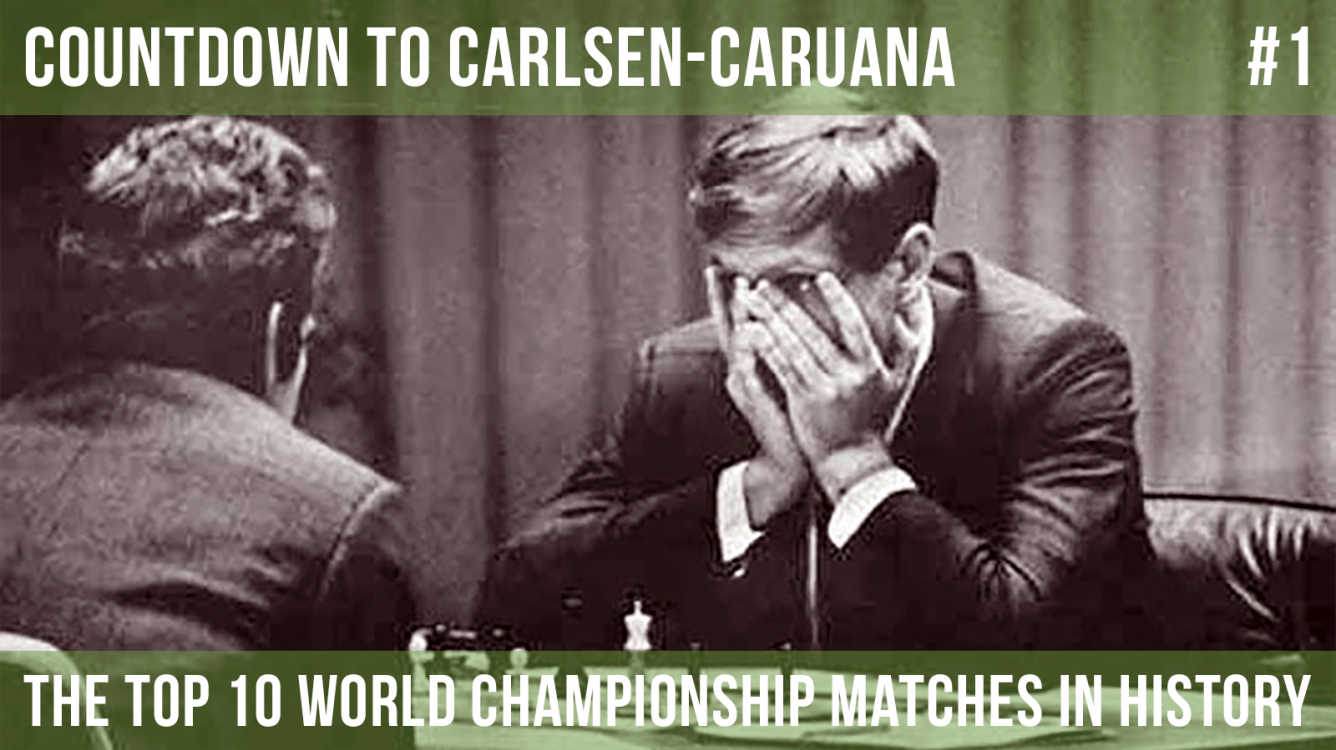
Fischer vs. Spassky | World Chess Championship 1972
The most exciting world championships of all-time countdown ends with a nearly consensus pick: Bobby Fischer vs. Boris Spassky in 1972 in Iceland.
The match tallied an amazing 72 points (with eight judges, a maximum score would have been 80), which was 35 higher than second place. Fischer vs. Spassky was the only match that every single judge voted for.
Six of the eight panelists from the Chess.com content team ranked it number one; NM Sam Copeland had it second place and NM Dane Mattson ranked it third. Recall that their votes for first place were Kasparov vs. Karpov, 1987 (Copeland) and Botvinnik vs. Bronstein, 1951 (Mattson).
The winning match will come as a no surprise to those readers following the list of the top 10, as omitting it would be the editorial equivalent of blundering scholar's mate. While the match did not come down to the final game, it did have plenty going for it. To wit:
- Plenty of Cold-War era overtones, as the Soviet Union often equated chess dominance with intellectual and educational superiority
- The ideal of the "solitary man" as Fischer was almost an island against a cadre of players and government officials assisting Spassky
- Fischer's remarkable run in the Interzonal and Candidates' matches were he won 20 games in a row (the final seven in the Interzonal in Spain, two 6-0 match routs against Mark Taimanov and Bent Larsen, and the first game in the finals against Tigran Petrosian).
- Fischer threatening to not attend the match at all, even eliciting the intervention of U.S. Secretary of State Henry Kissinger, who phoned the American to plead with him to attend
- Live coverage provided in the U.S. with NM Bruce Pandolfini and Shelby Lyman, helping to later inspire a "Fischer boom" of American clubs and tournament players
- The dull draw in game one getting turned on its head with Fischer's profligate 29...Bxh2?!, which has become one of the most analyzed moves in chess history
- Fischer's forfeit in game two and the related conspiracy theories of cameras, chairs and electronic bugs (the match even moved to a private room for one game upon resumption)
- The quickness of his comeback, including his first-ever win against Spassky in game three with 11...Nh5!, a move so surprising it is even its own t-shirt
- Overall, nine(!) of the first 13 games decisive, something we may never see again in a world championship match
- The first-ever official world championship for an American, ending a run of 10 consecutive matches won by Soviet players
- All of the media, Hollywood movies, documentaries, FBI, and KGB files released decades later, where the chess public is still learning more about the match to this day
If you are feeling the intense buildup from this article, just think about how it must have felt in 1972! On to the games:
In the opener, Fischer went recklessly pawn-grabbing, which cost him the point, but in doing so he set the tone as a fearless player that wouldn't settle for quiet draws.
The next day, Fischer dug himself an 0-2 hole and lost one of his turns with White when he refused to show up because of the proximity of television cameras. The match moved to a "ping pong" room for game three, where Fischer struck back with a knight posting that is now immortalized on a t-shirt by the Q Boutique in St. Louis.

Spassky stabilized the situation briefly with a draw as Black in game four, but then Fischer won the next two to take the lead. Game five knotted the match at 2.5-2.5 after the reigning champion fell victim to a blunder reminiscent of Fischer's Candidates' opponents. "Fischer fever" seemed to still be contagious:
Fischer took the lead in game six by playing the Queen's Gambit for the first time in his life. The movie "Pawn Sacrifice" called this effort the best chess game of all time. While that superlative is highly debatable, it was a punishing effort by Fischer, and the opposite of winning via one-move blunder:
Here's that Hollywood treatment of game six:
It's true what you saw in the film—Spassky really did applaud with the audience following the game.
Fischer picked up another game in round eight, then won again on this next turn with White to make the score 6.5-3.5. His long tactic led to an interesting ending of rook against bishop+two passers, but Spassky barely even managed to have them cross the halfway point of the chessboard.
Spassky got his best win of the match the next round to briefly make it interesting (his only other wins were the first two rounds—the speculative Bxh2 game and the forfeit). In fact, Fischer was crushed in the Najdorf Poisoned Pawn variation, his only loss ever as Black in that opening.
Fischer then uncorked Alekhine's Defense in round 13, but it is the ending that this win will be best remembered for. In case you are wondering, don't believe the equivalency you were taught as a child. Five passed pawns beats a rook!
Here's the praise heaped upon the game from another world championship challenger, David Bronstein:
"Of all the games from the match, the 13th appeals to me most of all. When I play through the game I still cannot grasp the innermost motive behind this or that plan or even individual move. Like an enigma, it still teases my imagination."
Fischer rode out his lead with seven consecutive draws, and then won the title when Spassky resigned by phone in a losing position in game 21. The final score was 12.5-8.5 for Fischer.
Will Caruana-Carlsen 2018 live up to this 1972 match? Will it even make a future "top-10" list of most exciting world championships? We will all find out soon! Let us know in the comments if you think the upcoming match could possibly top any of the ones from our list.
The Most Exciting World Chess Championships Ever:







